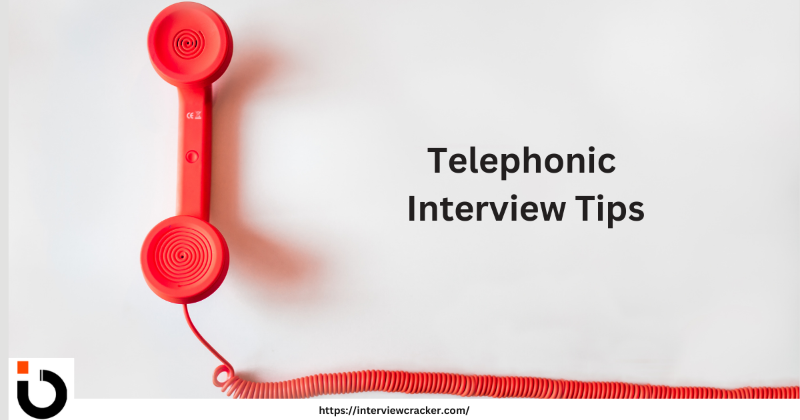This guide will provide insights, telephonic interview questions and answers, and valuable tips to help you excel in telephonic interviews for both experienced candidates and freshers.
Table of Contents
ToggleWhat is a Telephonic Interview? What Does a Telephonic Interview Mean?
A telephonic interview is a remote interview conducted over the phone, typically used for initial screenings or discussions with job candidates. It assesses your qualifications, personality, and communication skills.
Telephonic Interview Definition
A telephonic interview is a job interview conducted over the phone, focusing on assessing a candidate’s qualifications and suitability for a position.
Sample Telephonic Interview Questions for Freshers
“Tell me about yourself.”
“Why are you interested in this role?”
“What do you know about our company?”
“Describe a challenging situation you’ve faced and how you handled it.”
“Where do you see yourself in five years?”
Freshers should engage in a polite, professional conversation, highlighting their educational background, enthusiasm, and willingness to contribute to the organization.
Freshers should focus on showcasing their eagerness to learn, their educational background, and any relevant coursework or internships.
Telephonic Round Interview Questions for Experienced Candidates:
Experienced candidates may encounter questions related to their previous roles, leadership experiences, challenges faced, and their contributions to their previous employers.
Here are 10 common phone interview questions and answers examples often asked to experienced candidates:
1. Can you walk me through your resume and highlight the most relevant experiences for this role?
This question helps the interviewer understand your background and how it aligns with the position.
2. What challenges have you faced in your previous roles, and how did you overcome them?
This explores your problem-solving skills and resilience in challenging situations.
3. Why are you interested in this position, and what makes you a good fit for our company?
This gauges your motivation and how well you understand the company and its needs.
4. Can you describe a situation where you had to manage multiple priorities? How did you handle it?
This assesses your time management and organizational skills.
5. Tell me about a time when you disagreed with a colleague or manager. How did you handle it?
This question looks at your interpersonal and conflict resolution skills.
6. What are your key strengths and weaknesses, and how have they impacted your work?
This explores your self-awareness and how you use your strengths and manage your weaknesses.
7. Describe a successful project you led or contributed to. What was your role, and what was the outcome?
This helps the interviewer understand your leadership and teamwork abilities.
8. How do you stay updated with the latest industry trends and advancements?
This evaluates your commitment to continuous learning and staying current in your field.
9. Can you discuss a time when you had to make a difficult decision under pressure? What was the outcome?
This examines your decision-making skills, especially in high-pressure situations.
10.What are your salary expectations, and are you open to negotiation?
This question assesses your compensation expectations and flexibility.
These questions help interviewers assess your experience, skills, and fit for the role. Preparing for them will enable you to articulate your qualifications effectively.
Sample Telephonic Interview Questions and Answers:
How to Introduce Yourself in a Telephonic Interview:
Example for Freshers: “Hello, my name is [Your Name]. I recently completed my degree in [Your Field] from [Your University]. I am excited about the opportunity to work with your organization and bring my fresh perspective and eagerness to learn to the team.”
Sample for Experienced Candidates: “Hello, my name is [Your Name]. I have [X years] of experience in [Your Industry], specializing in [Your Expertise]. I’m excited to discuss how my skills align with the opportunities at your esteemed organization.”
“What is your greatest strength?”
A: “My greatest strength is my ability to adapt to new situations quickly. In my previous role at [Previous Company], I was often required to learn new technologies and processes rapidly, which I believe makes me an asset to any team.”

Phone Interview Conversation Sample for Freshers | Phone Interview Script for Interviewer
Interviewer: Good morning, [Candidate’s Name]. How are you today?Candidate: Good morning! I’m doing well, thank you. How about you?
Interviewer: I’m well, thank you. Let’s get started. Could you please introduce yourself and tell me a bit about your background?
Candidate: Certainly. My name is [Candidate’s Name], and I recently graduated with a degree in [Your Major] from [Your University]. During my studies, I focused on [specific areas or projects], which gave me a strong foundation in [relevant skills or knowledge]. I’m excited to start my career and apply what I’ve learned in a practical setting.
Interviewer: That sounds great. Can you tell me why you are interested in this position and our company?
Candidate: I’m particularly interested in this role because it aligns with my academic background and interests in [specific field or industry]. I’ve researched your company and am impressed by your commitment to [specific company values or projects]. I believe this position offers a great opportunity to learn and contribute, and I’m eager to be part of a team that is making a positive impact in the industry.
Interviewer: Excellent. Can you describe a project or an assignment during your studies where you faced a challenge and how you handled it?
Candidate: Certainly. During my final year, I worked on a group project where we had to develop a [specific project]. Initially, we struggled with [describe the challenge], but I took the initiative to [describe your action]. By collaborating closely with my team and dividing tasks according to our strengths, we were able to overcome the issue and successfully complete the project, even receiving positive feedback from our professor.
Interviewer: That’s a great example. How do you manage your time and prioritize tasks, especially when you have multiple deadlines?
Candidate: Time management is something I’ve always valued. I usually start by listing all my tasks and then prioritize them based on deadlines and importance. I use tools like [mention any tool or method you use, e.g., calendars, task lists, or apps] to stay organized. For example, during my final exams, I balanced multiple subjects by creating a study schedule that allowed me to allocate enough time for each topic without feeling overwhelmed.
Interviewer: Good to hear. Since this is your first professional role, what do you expect to learn or achieve in this position?
Candidate: I’m looking forward to gaining practical experience and understanding how theoretical knowledge is applied in real-world situations. I hope to develop my skills in [mention specific skills relevant to the job], contribute to team goals, and learn from the experienced professionals in your organization. My goal is to grow within the company and take on more responsibilities as I develop.
Interviewer: That’s a positive attitude. Lastly, do you have any questions for me about the role or the company?
Candidate: Yes, thank you. I’m curious about the kind of projects the team is currently working on and what success looks like in this role. Also, could you share more about the opportunities for professional development and growth within the company?
Interviewer: Those are excellent questions. Let me explain…
This sample conversation provides a framework for freshers to approach a phone interview confidently. It emphasizes clear communication, preparedness, and an eagerness to learn, which are key qualities employers look for in entry-level candidates.

Telephonic Interview Tips:
- Find a quiet space with good reception to avoid interruptions.
Prepare your answers in advance for common questions.
- Speak clearly, with a moderate pace.
- Listen attentively and ask for clarification if needed.
- Have your resume and job description in front of you for reference.
- Be concise in your responses.
8 Bonus Tips for Telephonic Interviews:
1. Telephonic Interview and Assessments:
Some telephonic interviews may include assessments or tests relevant to the position. Prepare in advance if you’re informed about such assessments.
2. Telephonic Interview with Multiple Interviewers:
In some cases, you may face a panel of interviewers during a telephonic interview. Address each interviewer individually and maintain a professional demeanor throughout.
3. Telephonic Interview for Remote Internships:
Remote internships often involve telephonic interviews. Highlight your ability to work independently, learn quickly, and adapt to remote work environments.
4. Telephonic Interview Techniques for Success:
Techniques like active listening, mirroring the interviewer’s tone, and using positive language can enhance your chances of success during a telephonic interview.
5. Telephonic Interview and Industry-Specific Questions:
Different industries may have unique interview questions. Research common questions in your specific field and prepare accordingly.
6. Handling Behavioral Questions:
Behavioral questions often aim to assess how you’ve handled specific situations in the past. Use the STAR method (Situation, Task, Action, Result) to structure your responses clearly.
7. Telephonic Interview Challenges for Introverts:
Introverts may find telephonic interviews challenging, as they rely solely on verbal communication. Practice answering questions and expressing enthusiasm to overcome this hurdle.
8. How to Impress During a Telephonic Interview:
Impress the interviewer by demonstrating your enthusiasm for the role, showing knowledge of the company, and asking insightful questions about the position and organization.
Advantages of Telephonic Interviews:
- Convenience: No need to travel; you can participate from anywhere.
Focus: Eliminates visual distractions, allowing both parties to concentrate on the conversation.
Efficiency: Initial screenings can be done swiftly, saving time for both candidates and employers.
How to Prepare for a Telephonic Interview?
- Research the company and role.
- Review common interview questions and prepare answers.
Practice with a friend or mentor through mock telephonic interviews.
Ensure a good network signal.
Dress professionally to create a positive mindset.
- The Importance of a Clear Phone Line: Ensure that your phone line is clear and free from background noise. If you’re in a noisy environment, consider using a headset with a microphone to improve audio quality.
- Have your resume and relevant documents ready
Telephonic Interview Etiquette:
Maintaining proper phone interview etiquette is essential. Avoid interrupting the interviewer, speak politely, and use professional language. Thank the interviewer for their time at the end of the call.
Handling Technical Difficulties:
Be prepared for technical glitches during a telephonic interview. If the call drops or there are connectivity issues, remain calm and contact the interviewer to resolve the problem promptly.
Overcoming Phone Anxiety:
Some individuals experience phone anxiety, which can affect their performance during a telephonic interview. Practice speaking on the phone with friends or family to build confidence and overcome this anxiety.
The Role of Non-Verbal Communication:
While telephonic interviews focus on verbal communication, your tone of voice and pace can convey enthusiasm and interest. Smile when speaking; it can positively impact your voice.
Telephonic Interview and Cultural Sensitivity:
In international job markets, telephonic interviews may involve interacting with interviewers from different cultures. Be aware of cultural differences in communication styles and etiquette to ensure respectful interactions.
Building Rapport During a Telephonic Interview:
Building rapport with the interviewer can create a positive impression. Ask open-ended questions, show genuine interest in the role, and express your eagerness to contribute to the team.
Telephonic Interview Mistakes to Avoid:
Common mistakes to avoid during telephonic interviews include:
- speaking too quickly,
- interrupting the interviewer,
- providing overly long responses, and
- not actively listening to questions.
Post-Telephonic Interview Self-Evaluation:
After a telephonic interview, take time to evaluate your performance. Identify areas where you excelled and areas for improvement to enhance your future interview strategies.
Telephonic Interview Follow-Up:
Just like in face-to-face interviews, sending a follow-up email after a telephonic interview is a good practice. Express your appreciation for the opportunity, reiterate your interest, and briefly summarize your qualifications.
Conclusion
Telephonic interviews are an integral part of the job application process. By mastering the art of telephonic interviews, you can effectively convey your qualifications, enthusiasm, and professionalism to potential employers. Whether you are an experienced candidate or a fresher, these tips and strategies can help you navigate telephonic interviews with confidence and success. Remember that preparation, clear communication, and a positive attitude are key to acing telephonic interviews in today’s competitive job market.
FAQs
Is a Telephonic Interview a Video Call?
No, a telephonic interview is conducted exclusively through voice communication over the phone, while a video call interview involves both audio and video interaction.
Telephonic Interview vs. Video Call?
A telephonic interview is conducted over the phone, while a video call interview involves both audio and visual communication through platforms like Zoom or Skype. Telephonic interviews focus solely on verbal communication.





